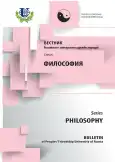No 3 (2008)
- Year: 2008
- Articles: 14
- URL: https://journal-vniispk.ru/2313-2302/issue/view/23424
Articles
Historicity and Sense of History in Heidegger's «Being and Time»
Abstract
The article is devoted to the examination of the basic notions for the understanding of the essence of the history such as «historicity» and «sense of history» in Martin Heidegger's fundamental ontology (ontological phenomenology).
These notions are researched on base of existential ontological interpretation of the text of «Being and time». It is shown that the in according with Heidegger's philosophy the notion «historicity» directly connects with the comprehension of «sense of history». In same time comprehension of «sense of history» and «historicity» at all may be explain through the existential understanding of own temporality.
RUDN Journal of Philosophy. 2008;(3):5-14
 5-14
5-14


The Philosophical Basis of the Uniform Education Area of the CIS States Formation
Abstract
Formation of the uniform education area of the CIS states (Commonwealth of Independent States) replies to calls of global economy, politics. Moreover this phenomenon is the powerful tool of society consolidation within the post-Soviet space and outside it. In the current article the scholarly approach to examination of integration process of educational systems of the CIS states to the uniform education area on the basis of methodology of education philosophy is offered.
RUDN Journal of Philosophy. 2008;(3):15-25
 15-25
15-25


The Influence of Martin Heidegger's Fundamental Ontology on the Orthodox Personalism of Twentieth Century
Abstract
The paper analyses different aspects of influence of Heidegger's philosophic works on the theology and religious philosophy of XX century. Due to involvement of categorical apparatus of fundamental ontology, works of Greek philosopher Christos Yanaras and Metropolitan John (Zizioulas) have made it possible to study the anthropological and social sides of the theological heritage of Eastern Church deeper. Author points out the conceptual resources of this heritage and suggests the idea of possible mutual enrichment of current philosophiec and theological discourse.
RUDN Journal of Philosophy. 2008;(3):26-31
 26-31
26-31


Being and Time in Africa Mythical-Poetical Tradition
Abstract
In the article, main provisions of African mythology, those about being and time, are considered. It is displayed that time is understood as an aggregate of specific phenomena and occurrences; time spreads not linearly from past to future, but from present to past. All doings of a man are explored through the prism of mythological thinking. Authors' attention is centered at the substantial peculiarities of a man's being that spreads in different dimensions of time, i.e. of past (macro chronos) and of present (microchronos).
RUDN Journal of Philosophy. 2008;(3):32-43
 32-43
32-43


Inculturation of Manichean in Chinese Society
Abstract
This article is devoted to historical-philosophical aspects of studying a spiritually multifaceted phenomenon of Manicheanism, especially in its Chinese interpretation. Having emerged in the Middle East as a syncretic philosophical-religious teaching, Manicheaenism penetrated into the territory of China by the VII century A.D. and, having absorbed and processed main autochthon directions of religious-philosophical thought (Buddhism, Daoism), managed to adjust successfully in the foreign culture and exist up to the XVI century.
RUDN Journal of Philosophy. 2008;(3):44-55
 44-55
44-55


The Discussion of Eurasian Movement About the Church, the Person and the State
Abstract
This article has been published to analyze main ideas by рhilosophers' of «classic» Eurasian doctrine - the doctrine of Russian emigrants of the first third of XX century. It has been demonstrated different points of view on the Church, the Person and the State. The author based on documents of «classic» Eurasian doctrine, articles and books by modern scientists of the Eurasian movement. It has been considered the more discussion's moments of Eurasian doctrine.
RUDN Journal of Philosophy. 2008;(3):56-63
 56-63
56-63


Conditions and Sence Horizon of Concept «Engagement» in Philosophy of E. Mounier
Abstract
This text describes the concept of engagement by the French philosopher E. Mounier. It examines the role of engagement in 20th century philosophy. The concept of engagement was brougtn in the personalisme by a german philosopher Landsberg. Mounier found it the key to undestarding the problem of personal engagement in history.
For Mounier, personality exists to cross the engagement. The engagement according to Mounier is an intimasse act and that is why it is sacred. This character of engagement gave birth to the personality that is capable to take responsibility for humanity.
By the French philosopher, the necessity of engagement was the principal vocation of her generation.
RUDN Journal of Philosophy. 2008;(3):64-71
 64-71
64-71


S2rdhara's Theistic Doctrine
RUDN Journal of Philosophy. 2008;(3):72-75
 72-75
72-75


Srdhara. Nyayakandali
RUDN Journal of Philosophy. 2008;(3):76-83
 76-83
76-83


Contemporary Informational Society: Anthropological Aspect
RUDN Journal of Philosophy. 2008;(3):84-92
 84-92
84-92


Eidos of the Body as the Forming Reality Perception Limit of the Person
RUDN Journal of Philosophy. 2008;(3):93-97
 93-97
93-97


On Dynamic Conception of Knowledge
RUDN Journal of Philosophy. 2008;(3):98-102
 98-102
98-102


Historical-Philosophical context of «Talks on the sixth day» of Archbishop Vasily the Great
RUDN Journal of Philosophy. 2008;(3):103-108
 103-108
103-108


Innovative educational programs on comparative studies in philosophy of a new generation
RUDN Journal of Philosophy. 2008;(3):109-117
 109-117
109-117











